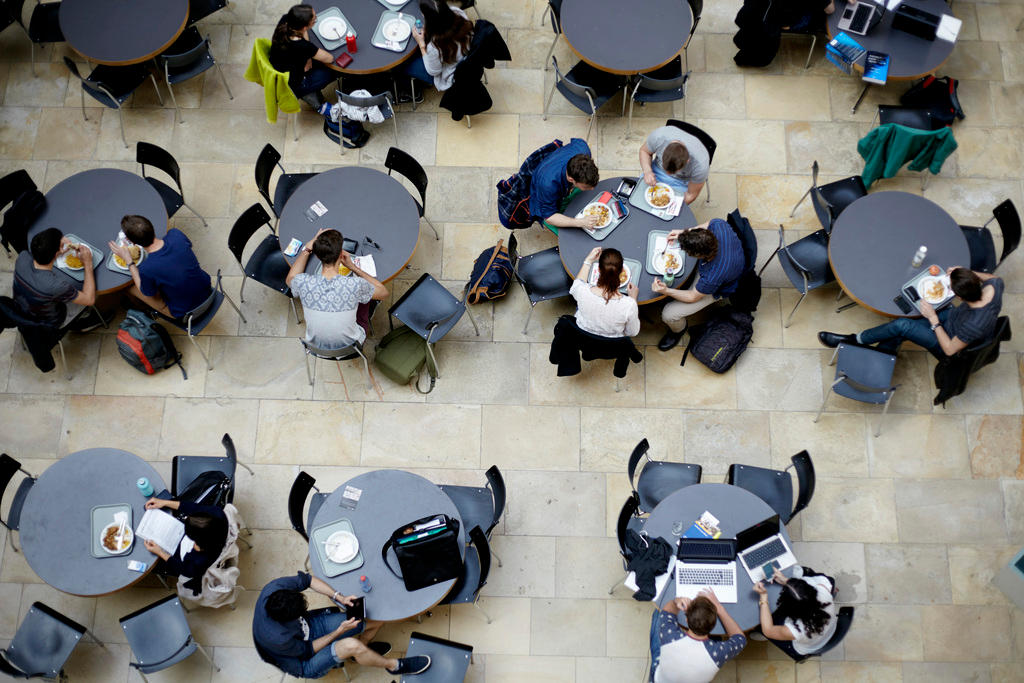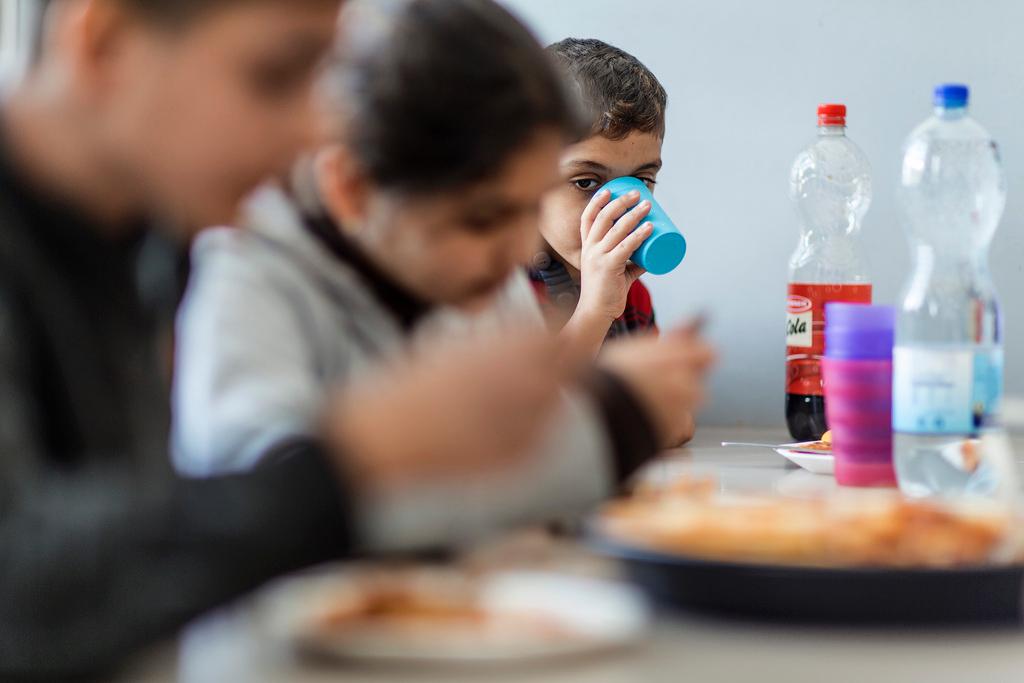Refugees get a taste of Swiss university life

Students at Swiss universities have banded together to find ways for refugees to attend their schools on a trial basis, but earning a diploma may remain out of reach for many who lack specific entry requirements.
One such refugee never expected to end up in Switzerland. Sitting on the airplane on his way from Zimbabwe, he thought about what he knew about the country: not much.
“I knew that it is a chocolate country,” says the refugee, Mambo Mhozuyenikono, who fled his home country and agreed to be interviewed only if his real name was not used. He has been living near Zurich for seven months.
That day on the plane, he wondered nervously whether anyone in Switzerland would speak English.
He soon found the Swiss to be accommodating and largely fluent in English, but he also learned that continuing his education – his No. 1 goal – would require him to know German, a language he had hardly even heard before.

More
Pursuing a degree after fleeing to Switzerland
Armed with a Bachelor’s degree in international development from his home country and eager to continue two unfinished research projects, Mhozuyenikono started perusing Swiss university websites, piecing together whatever information he was able to understand.
One day, he came across a colourful banner on the University of Zurich’s homepage advertising a trial semester for refugees. The first thing he checked was the language requirement and was happy to find that he qualified even with his low level of German. One application and several interviews later, he is now part of the university’s first-ever class of refugee students.
Pilot project
The 20 refugees in the trial programme – eight women and 12 men – come from Syria, Eritrea, Afghanistan and Iran, plus Chechnya, Palestine and Zimbabwe. Picked from a pool of nearly 80 applicants, they are allowed to choose and attend courses for one semester with the help of a student mentor who guides them through the process. But they may not receive university credit or take the exams, since they haven’t been accepted as formal students.
Any refugee student who wants to truly attend a Swiss university, earning grades and a degree, must apply through the normal process with no special accommodations. At the University of Zurich, that means proving near-total fluency in German at a C1 level and, usually, passing an equivalency test for the Swiss baccalaureate.
Student organiser Christian Schmidhauser, who helped bring about the trial semester at the University of Zurich, thinks refugees can master the language requirement. But he and his fellow student organisers aren’t so sure about the equivalency exam – known as the ECUS – which is very difficult to pass even with pricey preparatory courses.
In January, the Swiss Students’ Association formally called on universities, cantons and social service organisations to make it easier for refugees to earn degrees in Switzerland. Specifically, they called for a return to the days when ECUS exam preparation costs were subsidised to make the required qualification more accessible.
Martina Weiss of swissuniversities, the umbrella organisation for Swiss higher education institutions responsible for administering the ECUS exam, told swissinfo.ch that there are currently no plans to lower the exam fees of CHF980 ($980) in the German-speaking part of Switzerland and CHF870 in the French-speaking part.
Nor does she know of any plans to resurrect a foundation that used to provide subsidised exam preparation but stopped doing so years ago. In Zurich, an exam preparation course for the three required subjects on the exam costs CHF12,950 with additional subject-based courses costing anywhere from CHF3,000 to CHF7,000.
“There are many actors involved in this question, from the universities to migration authorities and politicians,” she says. “Of course it’s better if refugees have opportunities to study, but the impulse needs to come from many sides, not just one.”
All potential students must be treated fairly and equally, she adds.
“It is certainly important to make higher education accessible to refugees, but it’s also important to treat Swiss students the same way.”
The Swiss experience
So far, Mhozuyenikono – who doesn’t want to reveal the exact reasons for his escape from Zimbabwe for fear of endangering his family who still lives there – is starry-eyed about his Swiss university experience. He bounces into his afternoon lecture full of energy and hangs on the professor’s every word.
“I cannot understand how any individual would not succeed at this university where everything has basically been made easy for you,” he says. “It’s phenomenal.”
He explained the key differences between his home university and the experience he’s had so far in Zurich.
Even though the language requirements and ECUS fees may ultimately remain out of reach for many of the refugees, Schmidhauser and his fellow students were still determined to make their trial experience at the university as positive as possible. Drawing on experiences from other universities with similar offerings in Germany and Basel, they set the German language requirement for the trial semester at an early intermediate level, enough to understand lectures but not so high as to shut people out. Student organisers also cleared administrative hurdles to allow refugee participants to check out library books, eat at university cafeterias and use sports facilities.
The organisers have also benefited from the offering. Mitra Tavakoli, a student mentor who helps Mhozuyenikono find his way at the university, says she rarely comes across international students in her everyday life and was seeking more cultural exchange when she volunteered to help.
“I’m not doing it only because of the refugee crisis; I’m just curious about other cultures and wanted to donate my time in some way,” she said.
Mhozuyenikono is lucky – he’s found a joint Masters degree in international comparative studies offered by the University of Zurich and the Federal Institute of Technology ETH Zurich, taught in English, that sounds right up his alley. He plans to apply as soon as possible but says meeting all of the requirements will still be difficult for him.
“I hope that there could be some form of understanding for people who are special cases and who will not be able to competitively provide some of the information required,” he says. “Inviting you for an interview to see if you qualify could be good. Otherwise they risk shutting out people who have a real capability to impactfully share ideas about things that are studied here.”
‘Discovery semester’
Several Swiss universities, including the University of Basel, University of Lucerne and the Federal Institute of Technology ETH Zurich, have introduced ways for refugees to try attending their institutions to grow their perspectives and opportunities. The University of Zurich – Switzerland’s largest university – began its so-called “discovery semester” for refugees in the spring semester of 2017.
The discovery semester offers 20 places for refugees who have already fully or partly studied at a university and allows them to prepare for a possible formal application to the university at a later date.
The participants get support from an assigned student mentor and can improve their language skills at the university’s language teaching centre.
Refugees interested in future “discovery semester” opportunities may contact the University of Zurich’s International Relations OfficeExternal link for more information.

In compliance with the JTI standards
More: SWI swissinfo.ch certified by the Journalism Trust Initiative











You can find an overview of ongoing debates with our journalists here . Please join us!
If you want to start a conversation about a topic raised in this article or want to report factual errors, email us at english@swissinfo.ch.